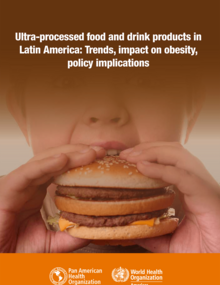The increasing burden of ill health and premature deaths attributable to chronic non-communicable diseases (NCDs), particularly affects low and middle-income countries and the key underlying but modifiable risk factors are tobacco, harmful use of alcohol, physical inactivity, and low-quality diet. Poor nutrition is a major cause of illness and mortality as documented in the Global Burden of Disease Study 2010, with nutritional factors now being a major contributor to years of life lost and years lived with disease in the Americas.
This report is timely and provides an up-to-date comprehensive perspective on global shifts in sales of ultra-processed food and drink products over the past decade while exploring the connection between the surge in market share and the epidemic of obesity in Latin America. It examines trends in sales of ultra-processed products, their distribution in supermarkets and retail outlets, and market concentration. The report also examines how sales are associated with socioeconomic drivers including patterns of urbanization, income growth, and market deregulation. While sales volumes remain higher in high-income countries, the rate of growth was faster in lower-income countries during the period 2000 to 2013. Consistent with previous findings, sales of ultra-processed products are associated with weight gain and obesity in Latin America. The solutions to this epidemic of unhealthy diets can be found in sound public policies and this monograph provides clear guidance on the way forward.
|

